|
|
|
Sort Order |
|
|
|
Items / Page
|
|
|
|
|
|
|
| Srl | Item |
| 1 |
ID:
144982
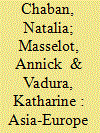

|
|
|
|
|
| Summary/Abstract |
This special issue sets out to explore the responses of norm-receivers to EU export of
norms and values. The main focus of this special issue is on the Asian recipients of EU
norms. The leading theoretical explanations—used by all contributors to this Issue—
are from the revisited analytical framework of ‘Normative Power Europe’ (NPE). NPE
is a popular conceptual paradigm that has informed debate about the EU since the early
2000s. Introduced in the seminal work by Ian Manners (2002), it remains a useful and
intellectually attractive model to understand the EU and its actions both internally and
externally. Its appeal lies in its emphasis on ideas; its open, eclectic and critical nature;
and its focus on explanations of power beyond state-centred models
|
|
|
|
|
|
|
|
|
|
|
|
|
|
|
|
| 2 |
ID:
144988
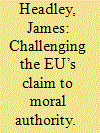

|
|
|
|
|
| Summary/Abstract |
Normative Power Europe is not just an academic concept: it is part of the self-understanding of many EU policymakers. They believe that the EU is setting standards of state behaviour in Europe and globally. The EU is regarded as an elaborator and epitomizer of European and ‘civilised’ values, as a model for other regions and states and as inherently an ethical actor. Russian policymakers reject these notions and, in doing so, increasingly accuse the EU of ‘double standards’, arguing that EU external action is inconsistent and does not always match its rhetoric; that the rhetoric therefore masks the pursuit of interests in its foreign policy; that the EU is like any other state (or state-like entity) and has no special claim to act ethically or to be a moral authority; and that internally, the EU does not live up to the values it seeks to impose on others. This article gives examples of Russian talk of EU double standards, analyses the motivations and assesses the likely impact. It argues that for such criticism to have any impact on EU policy, the critic must be seen as a moral equal, which the EU’s sense of moral superiority over Russia rules out.
|
|
|
|
|
|
|
|
|
|
|
|
|
|
|
|
| 3 |
ID:
144994


|
|
|
|
|
| Summary/Abstract |
This article aims to show that the European Union has normative power. Normative power is understood here as the capacity to promote norms by diffusion, based on persuasion, communication and interaction at large. The EU aims to influence the international order and to promote effective multilateralism. However, the further away from Europe the EU operates, the less it is able to use its traditional means of conditionality or its neighbourhood policy tools. Instead, the EU has to rely on diffusion mechanisms. This holds particularly true in the policy field of security where the EU has only limited capabilities for force projections and—given the specific nature of the defence market—only a limited role for the incentive of ‘market access’ and hence conditionality. Drawing on research on norm diffusion and taking into account the filter factors such as history, exposure and political systems that are at play in diffusion processes as well as the particular mechanisms at work, the European Union and its Member States seem to possess some normative power when meeting specific and growing demands for templates, know-how, procedures and processes to address today’s security challenges and operating on a global level with the new global stakeholders such as China and India.
|
|
|
|
|
|
|
|
|
|
|
|
|
|
|
|
| 4 |
ID:
144995
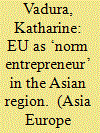

|
|
|
|
|
| Summary/Abstract |
The European Union (EU) is an entity in re-evolution in relation to the development of its human rights strategy. This paper will examine the EU’s human rights advocacy in external relations in the context of normative power Europe (NPE), particularly in relation to the notion of the EU becoming a ‘norm entrepreneur’ with its revised human rights ‘toolbox’. The promotion and protection of human rights is cited as being at the core of European values, together with democracy and the rule of law, having both an internal and external focus in rights promotion and protection. This paper endeavours to present an analysis of the EU as norm entrepreneur in the context of human rights advocate. In so doing, it will examine the question of EU visibility in terms of human rights promotion. In its external action, the EU has a number of ‘tools’ in its human rights toolbox. By applying a rights inclusion analysis to the tool of digital diplomacy in an Asian context, the question of EU as norm entrepreneur is seen to be driven by strategic interests and partnerships. This paper argues that the EU is an ‘inadvertent’ norm entrepreneur through its programmatic pursuit of being an entrepreneur for social good in its external action rather than norm diffusion as experienced in a European context.
|
|
|
|
|
|
|
|
|
|
|
|
|
|
|
|
| 5 |
ID:
144983
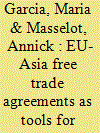

|
|
|
|
|
| Summary/Abstract |
Article 21 of the Treaty of Lisbon mandates the European Union (EU) to foster its values (democracy, the rule of law, social rights, gender equality, etc.) in its external relations. The core concern of the EU’s multi-faceted relations with Asia is economic relations with rising markets. EU relations with the region have focused on the facilitation of trade and investment through the negotiation of free trade agreements (FTAs) with a number of Asian partners. EU FTAs are accompanied by a Political Cooperation Agreement (PCA), which links core EU values to trade through the ‘standard clause’, whereby under certain circumstances, human rights’ abuses can trigger a suspension of trade preferences. Using a qualitative case study methodology, and drawing on policy documents and interviews, this paper addresses the question of whether, and how, the EU can balance its internal legal obligations with its economic interests and its partners’ demands. The article provides a legal background of the EU’s obligations in terms of international value promotion. It then reviews EU trade policy strategies and reveals an absence of a concerted approach to the inclusion of values. The article investigates the sources of resistance to EU attempts at linking its trade policy with broader values including social rights with Asian partners. The analysis reveals that Asian resistance is centred on the legalistic approach of the EU rather than the values and suggests that a more effective norm export might be achieved through other means. The article concludes that the EU’s failure to push forward social issues in FTAs ultimately casts serious doubts about the EU’s international ‘actorness’ in the area of social rights.
|
|
|
|
|
|
|
|
|
|
|
|
|
|
|
|
| 6 |
ID:
144992
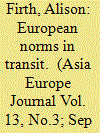

|
|
|
|
|
| Summary/Abstract |
Previous research has demonstrated that EU trade mark norms found their way into New Zealand law through the World Trade Organisation agreement on Trade-Related Aspects of Intellectual Property Rights (WTO TRIPS). This paper will give a brief résumé of that research and outline the current enquiry—whether these and related norms are likely to be re-transmitted, in identical or modified form. This could occur via the draft intellectual property chapter of the proposed Trans-Pacific Partnership (TPP) agreement. While this was under discussion, the EU and USA were negotiating a Trans-Atlantic Trade and Investment Partnership (TTIP) agreement. Although geographical indications (GIs, protected under trade mark law in the USA) have been a hot topic in TTIP negotiations, there is scant information on any possible chapter on GIs, trade marks and other forms of intellectual property in TTIP. However, US Trade Representative and TTIP negotiator Michael Froman has spoken admiringly of the intellectual property provisions in the draft TPP. If an intellectual property chapter were introduced into TTIP, it seems likely that TPP text would be adopted or adapted, bringing norms full circle back to the EU. In considering this possibility, it is suggested that the biological analogy of viral transfer of genetic code may be even more apt than that of transplants to illuminate the process of re-transmission of adopted or adapted legal norms through the medium of international treaties.
|
|
|
|
|
|
|
|
|
|
|
|
|
|
|
|
| 7 |
ID:
144986


|
|
|
|
|
| Summary/Abstract |
This article examines the extent to which ASEAN has adopted the constitutional norms of the European Union. Although much time has been spent examining ASEAN’s moves towards a more institutional, and thus a more “European” approach, to regionalism, such similarities are superficial. In reality, ASEAN remains a very different form of regional entity to its European cousin. It is the submission of this paper that such an approach is inevitable as the legal nature of the European Union’s constitutional structures demands both a supra-national legal framework and national judiciaries willing and able to accept its jurisdiction. The weak incorporation of the Rule of Law in the majority of ASEAN states means that Europe’s constitutional norms are likely to fall on stony ground for the foreseeable future.
|
|
|
|
|
|
|
|
|
|
|
|
|
|
|
|
| 8 |
ID:
144989


|
|
|
|
|
| Summary/Abstract |
This paper revisits some methodological issues regarding the application of ‘normative power Europe’ (NPE) as an analytical tool. It looks at the descriptive, interpretive and prescriptive aspects of NPE and identifies ontological and epistemological problems, further normative theorising and the empirical (ir)relevance within the case of China. Central to this paper is the emphasis on how to critically apply the NPE approach to a cross-cultural context in which universalist versus relativist paradigm, interpretivist versus positivist approaches and different ethical judgments can be combined and bridged. This paper argues that NPE helps us understand the EU’s identity creation which can be translated in matching policy terms, either by design or default. Despite its descriptive credibility, the explanatory power of NPE has been limited not just by differences concerning fundamental values, but the need to engage China on normative issues through cooperation and dialogue, a form of normative action itself. The prescriptive value of NPE, nevertheless, should be promoted in both academic and policy debates by strengthening the clarity and consistency of how the EU conveys this self-perception to the others. Finally, the paper concludes that applying the NPE approach empirical research requires theory refinement and operationalisation of the concept uniquely tailored to the chosen empirical cases. As far as China is concerned, detailed case-by-case analyses within a longitudinal time frame—which allows sufficient space for investigators to develop depth in inter-paradigm and inter-disciplinary research—would be useful in highlighting the strength of the NPE approach.
|
|
|
|
|
|
|
|
|
|
|
|
|
|
|
|
| 9 |
ID:
144985


|
|
|
|
|
| Summary/Abstract |
The article examines the European Union’s (EU) normative position regarding the Israeli-Palestinian conflict to advance three interrelated claims. First, that EU member states subscribe to a unified normative position because the normative sphere is cut off from the economic sphere. Second, that this separation facilitates the uniformity of the normative position but hinders the possibility of asserting some form of conditionality which might encourage the diffusion of Ian Manners’ five core norms. Finally, that normative power Europe is a practice of discursive representation deployed not so much to exert influence on the Other, but rather to help consolidate the European Union as a united actor.
|
|
|
|
|
|
|
|
|
|
|
|
|
|
|
|
| 10 |
ID:
144984
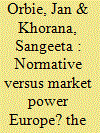

|
|
|
|
|
| Summary/Abstract |
The normative power Europe concept has greatly enriched the academic debate on what the EU is (should be), what it does (should do) and what impact it has (should have). However, various theoretical, methodological and empirical issues remain insufficiently addressed. This article will address two issues that have mostly been neglected: the perspective of the norm takers (in line with this special issue) and the market norms of the EU. The first section elaborates on these two issues, relying on recent advances in the literature and specifically the contributions by Damro (J Eur Publ Pol 19(5):682–699, 2012) and Rosamond (Brit J Polit Int Relat 16(1):133–148, 2013). Against this background, the second section examines the controversial EU trade negotiations with India. Specifically, this empirical part section focuses on how market liberal norms (government procurement) and cosmopolitan norms (human rights) are being promoted and received. We conclude that in the eyes of the EU, trade agreements could be a means to mitigate partners’ opposition and an eventual stepping stone for successful off-take of international social standards and multilateral procurement liberalization regulations by its partner countries. But, partner countries might not necessarily espouse the EU’s interest-led motivation and lend support to the EU’s desire to effuse multilateral norms through trading agreements. The case study on EU-India trade talks illustrates this, highlighting the divergence between the EU and Indian perspectives and demonstrates India’s lack of enthusiasm to adopt the EU’s preferred model for liberalization.
|
|
|
|
|
|
|
|
|
|
|
|
|
|
|
|
| 11 |
ID:
144987


|
|
|
|
|
| Summary/Abstract |
This analysis tackles a previously understudied topic—the ebb and flow of ideas towards the European Union (EU) as a ‘Normative Power’ found in an external society. It asks three questions. How can particular visions about a foreign policy actor—the EU in our case—be activated and disseminated in societies beyond the Union’s borders? Who are the key local actors who facilitate the spreading of these ideas? And how might the personal views towards the EU and its ‘Normative Power (NPE)’ identity of these key actors influence the activation of ‘NPE’ ideas in a given society? In answering these questions, this analysis brings together two theoretical models previously not linked—the NPE analytical approach (Manners, J Common Mark Stud 40(2):235–258, 2002) and the ‘cascading activation’ framing theory (Entman, Polit Commun 20(4):415–432, 2003, 2004). Empirically, this paper employs data from 74 face-to-face semi-structured interviews on the perceptions of the EU as a normative power. Interviews were held among the leading newsmakers from influential national media—news writers (journalists, columnists, reporters) and media gatekeepers (editors, news directors, publishers and news producers) from seven Asian countries.
|
|
|
|
|
|
|
|
|
|
|
|
|
|
|
|
|
|
|
|
|